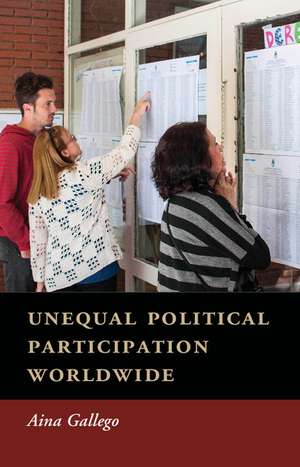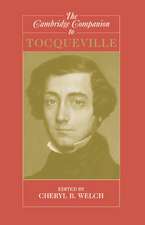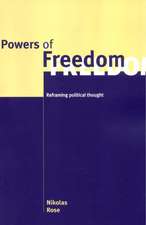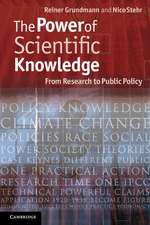Unequal Political Participation Worldwide
Autor Aina Gallegoen Limba Engleză Hardback – 7 dec 2014
Preț: 692.50 lei
Preț vechi: 778.08 lei
-11% Nou
Puncte Express: 1039
Preț estimativ în valută:
132.51€ • 141.70$ • 110.48£
132.51€ • 141.70$ • 110.48£
Carte tipărită la comandă
Livrare economică 18 aprilie-02 mai
Preluare comenzi: 021 569.72.76
Specificații
ISBN-13: 9781107023536
ISBN-10: 110702353X
Pagini: 252
Ilustrații: 18 b/w illus. 14 tables
Dimensiuni: 142 x 218 x 25 mm
Greutate: 0.48 kg
Editura: Cambridge University Press
Colecția Cambridge University Press
Locul publicării:New York, United States
ISBN-10: 110702353X
Pagini: 252
Ilustrații: 18 b/w illus. 14 tables
Dimensiuni: 142 x 218 x 25 mm
Greutate: 0.48 kg
Editura: Cambridge University Press
Colecția Cambridge University Press
Locul publicării:New York, United States
Cuprins
Introduction; 1. Unequal participation around the world; 2. Heterogeneous consequences of contexts on participation; 3. The difficulty of the voting procedure; 4. Government fragmentation and media systems; 5. Trade unions in the highly educated membership era; 6. Income inequality and the participation of lower-status groups; 7. Consequences of unequal participation for representation; Conclusions.
Recenzii
'Unequal Political Participation Worldwide is a book that I would love to have written. We take it as a fact that turnout is lower among the less educated. Gallego establishes that the relationship varies a lot among countries. She meticulously shows why. It all depends on institutional features that increase or decrease the costs of voting. The empirical demonstration is masterful and the interpretation elegant and careful. Read the book: you will learn a lot!' André Blais, Université de Montréal
'Gallego's cross-national study demonstrates that the basic democratic principle of 'one person, one vote' is often lacking in contemporary democracies. She marshals an impressive array of evidence from the comparative study of electoral systems and creative survey experiments to describe educational differences in voting turnout and the causal processes at work. This book yields valuable new insights into how context - ranging from electoral systems to income inequality - shapes electoral turnout, and why it matters.' Russell J. Dalton, University of California, Irvine
'In this important, clearly written book, Gallego shows that the linkage between education and electoral participation across thirty-six democracies varies enormously … The book is particularly impressive in [two] ways: the first is a careful distinction between homogeneous and heterogeneous effects, that is, factors that affect all potential voters equally versus differentially; the second … is the inclusion of three survey experiments testing the effects of ballot structures and the extent of electoral and governmental fragmentation on the probability to vote.' A. Siaroff, Choice
'Gallego's cross-national study demonstrates that the basic democratic principle of 'one person, one vote' is often lacking in contemporary democracies. She marshals an impressive array of evidence from the comparative study of electoral systems and creative survey experiments to describe educational differences in voting turnout and the causal processes at work. This book yields valuable new insights into how context - ranging from electoral systems to income inequality - shapes electoral turnout, and why it matters.' Russell J. Dalton, University of California, Irvine
'In this important, clearly written book, Gallego shows that the linkage between education and electoral participation across thirty-six democracies varies enormously … The book is particularly impressive in [two] ways: the first is a careful distinction between homogeneous and heterogeneous effects, that is, factors that affect all potential voters equally versus differentially; the second … is the inclusion of three survey experiments testing the effects of ballot structures and the extent of electoral and governmental fragmentation on the probability to vote.' A. Siaroff, Choice
Notă biografică
Descriere
This book describes the levels of unequal electoral participation in thirty-six countries worldwide.















